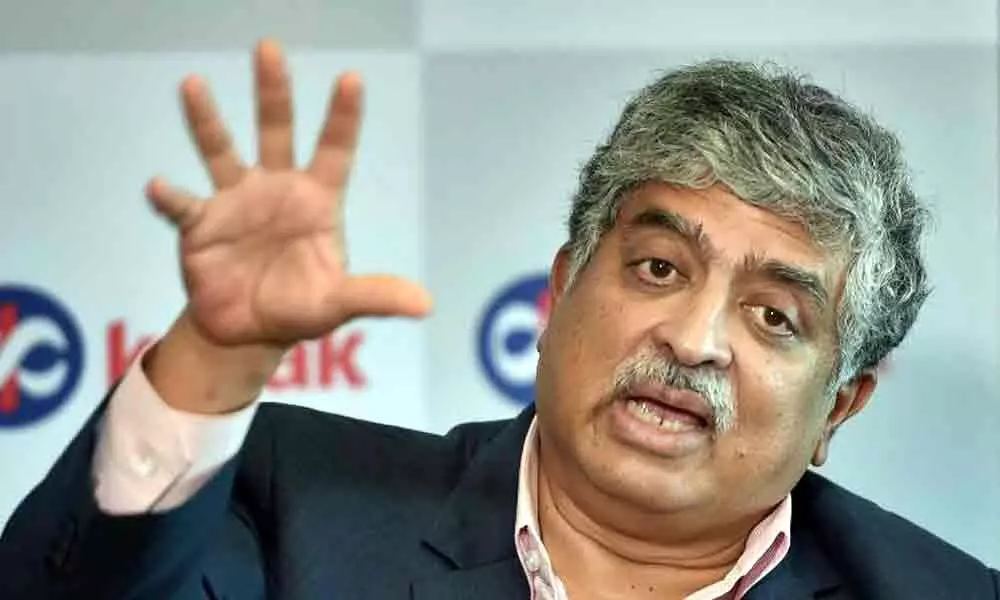Live
- PM Modi highlights govt's efforts to make Odisha prosperous and one of the fastest-growing states
- Hezbollah fires 200 rockets at northern, central Israel, injuring eight
- Allu Arjun's Family Appearance on Unstoppable with NBK Breaks Viewership Records
- Unity of hearts & minds essential for peace & progress, says J&K Lt Governor
- IPL 2025 Auction: I deserve Rs 18 cr price, says Chahal on being acquired by Punjab Kings
- EAM Jaishankar inaugurates new premises of Indian embassy in Rome
- Sailing vessel INSV Tarini embarks on second leg of expedition to New Zealand
- Over 15,000 people affected by rain-related disasters in Sri Lanka
- IPL 2025 Auction: RCB acquire Hazlewood for Rs 12.50 cr; Gujarat Titans bag Prasidh Krishna at Rs 9.5 crore
- Maharashtra result reflects the outcome of Congress' destructive politics: BJP's Shazia Ilmi
Just In
Coronavirus led to revival of technology, expertise, says Infosys co-founder Nandan Nilekani


Infosys Chairman Nandan Nilekani (Photo | PTI)
Nilekani said he is excited to see a large number of innovations happening in the areas of vaccination.
Ahmedabad: The coronavirus pandemic has led to the revival of technology and expertise, and brought the realisation that for the future of the world, "deep knowledge and deep technology" are required, Infosys co-founder Nandan Nilekani said on Sunday.
He said that during the ongoing crisis, digital and medical technologies stood out, which enabled people to work from home, among other things, and helped in dealing with the virus by developing better tests, drugs, and vaccines.
Nilekani also expressed happiness over the innovations in the field of vaccination, especially in India, and said that by the first half of 2021, vaccine-induced herd immunity can be achieved and things will start going back to normal.
The former Unique Identification Authority of India (UIDAI) chairman was addressing the graduating students of Indian Institute of Technology (IIT) Gandhinagar at its ninth convocation through video conferencing.
"Technology is now becoming central to our world. When you look at this crisis, two things stand out: one is digital technology and the fact that we are able to at least continue many of the things that we do, thanks to the tools like video conferencing, digitisation, e-commerce, and other online tools. And a large number of us are able to do this and work from home," he said.
"Another very important technology, which is now becoming apparent to the world, is the technology of medicines. Whether it is developing better tests so we can get quicker, faster results, whether it is getting drugs that can treat people who have got COVID-19 or creating the vaccines that can permanently get us out of the situation, technology is at the heart of it all," he said.
"And in some sense, therefore, this crisis has led to the revival of technology and the revival of expertise. For some time now, all over the world, expertise has got diminished, and everybody who is on WhatsApp is an expert.
"But now we realise that that for the future of the world, the future of the society, deep knowledge and deep technology is required, and that is what is going to save us in the end," Nilekani said.
He added that work from home could only become possible because of digital technology, the rise of the internet, big cloud operations, smart phones, and so on.
"Imagine if this (pandemic) had happened 20 years back, then we would not have been able to do anything. So, technology is actually what has helped us to do even the modicum of work we do in normal times," he said.
Nilekani said he is excited to see a large number of innovations happening in the areas of vaccination.
"India itself has many companies at least seven companies that manufacture vaccines. And India can rightly be called the vaccine capital of the world.
"And I am sure that both the vaccine manufacturing and R&D (research and development) in India will ensure that by early next year we have millions and millions of vaccines which we can start deploying," he said.
"And certainly I think in the first half of 2021, we will be able to have vaccine-induced herd immunity and things start going back to normal life," Nilekani said, adding that the crisis will eventually pass.
"It is really your attitude, your sense of the future which will give you the confidence to continue what you will do, and surely we will emerge from this crisis," he said, while also advising the graduates to continue learning as a life-long process.
During the virtual convocation ceremony, a total of 455 students- 173 of BTech course, 115 of MTech, 84 MSc, 19 MA, 55 PhD, seven PGDIIT, one BTech-MTech dual degree student, and one BTech-MSc dual degree student- were conferred symbolic degrees.

© 2024 Hyderabad Media House Limited/The Hans India. All rights reserved. Powered by hocalwire.com






